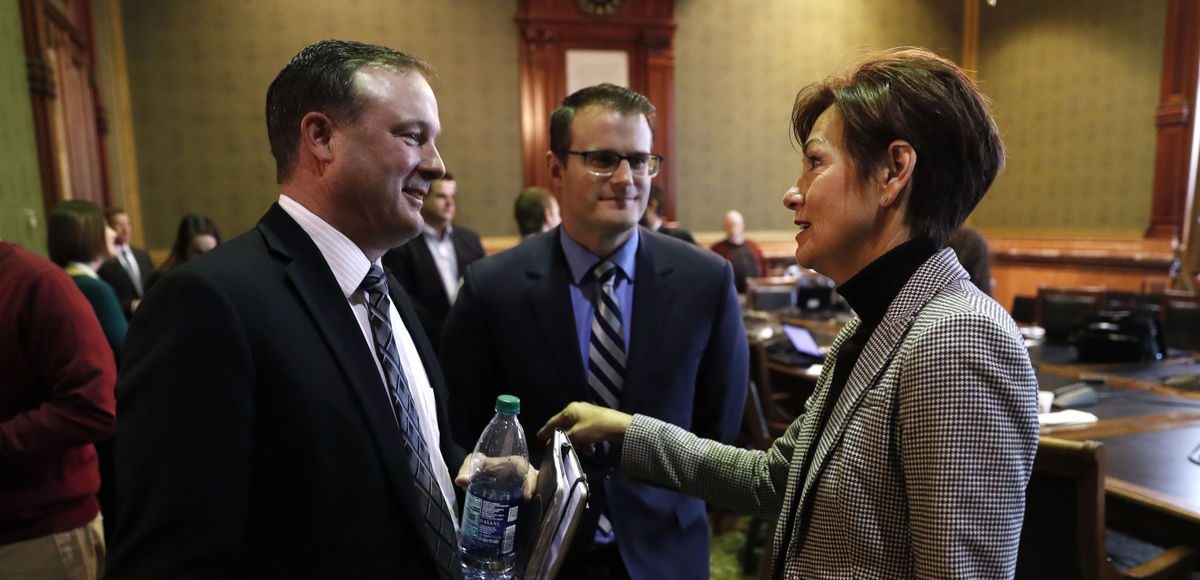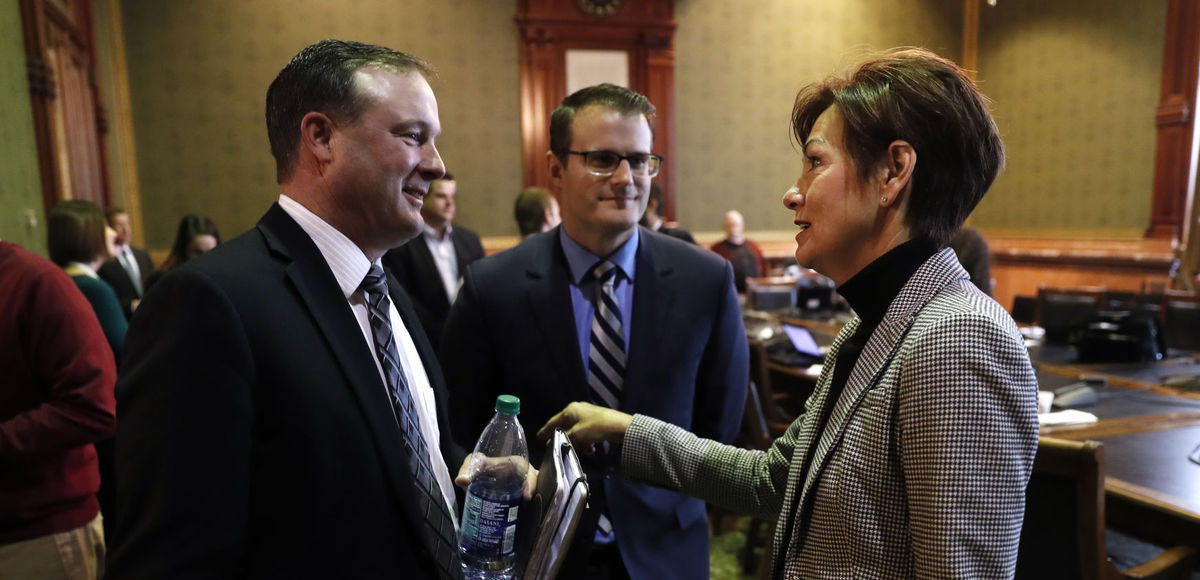

Iowa Senate Majority Leader Bill Dix, left, talks with Iowa Gov. Kim Reynolds, right, and acting Lt. Gov. Adam Gregg, center, during a legislative forum sponsored by The Associated Press, Thursday, Jan. 4, 2018, at the Statehouse in Des Moines, Iowa. (Photo: AP)
Iowa could become the 13th state to call for a convention of states to restrict the power and authority of the federal government and return it to the states. Last Wednesday, the Senate subcommittee taking up the measure approved it by a 2 to 1 vote.
Article V of the U.S. Constitution grants “two thirds of the several States” the power to “call a Convention for proposing Amendments” if they deem necessary. That means the movement would need 34 states to invoke Article V for a convention of states to convene. Once they adopt and ratify the amendments, they become part of the U.S. Constitution.
Primary sources from the founding fathers make it clear that they saw the need for states to have a backup plan in the event the federal government grew too powerful.
Joint Resolution 8, which already passed the lower chamber in the Hawkeye State, calls for a convention of states to impose fiscal restraints, limit the power and jurisdiction of the federal government, and to call on the U.S. Congress to propose similar amendments. It could be considered by the Senate State Government Committee as early as next week and supporters are pushing for a full vote in the upper chamber this session.
GOP Senate leadership did not immediately respond to a request for comment regarding the timeline of the vote.
“The reason for this is because our federal government is out of control,” Sen. Jason Schultz, R-Schleswig, who chaired the subcommittee said. “They are not going to reduce their own power or reach and it is up to the states, according to the convention, to pull the federal government back into the reins of the Constitution.”
State Senator Charles Schneider, R-West Des Moines, joined with Chairman Schultz in supporting the resolution. He said that he believes protections are in place to protect Americans from a “runaway convention.”
Not all Republicans are on board. The lines have not necessarily been drawn based on party. In truth, it’s more of an extension of the outsider versus insider dynamic that dominated the 2016 elections. Many Republican lawmakers who could accurately be characterized as Establishment also oppose the measure alongside Democrats, the latter obviously favoring a strong centralized government.
For instance, Tamara Scott of the Iowa Faith and Freedom Coalition and Concerned Women for America of Iowa, strongly opposed the resolution. She’s also a committeewomen at the Republican National Committee.
“If you can’t get people to come together and support the Constitution that you have now, what makes you think that they are going to come together later for a revised edition?” she said in an interview with the Des Moines Register. “This is going to cause unrest, it is going to unsettle what we have. The Constitution is not outdated. It is simply ignored. We need to uphold it; the power is already in place.”
Sen. Pam Jochum, D-Dubuque, joined Ms. Scott in opposing the resolution, calling it an agenda promoted by the billionaire brothers Charles and David Koch, philanthropists and businessmen who fund numerous conservative and libertarian organizations.
“First and foremost, I just think our Constitution is a living, breathing, document that has served our nation well and has protected our liberties and our freedoms,” she said. “I have some deep concerns about what the outcome of a convention would actually do. Rewriting the Constitution is not a good idea.”
But proponents of the convention of states point to rampant judicial activism that creates new rights and destroys old ones enshrined in the already written U.S. Constitution. There is no recourse after a 100 years of ever-expanding federal power.
In Notes on the State of Virginia, Thomas Jefferson supported states having the power to invoke Article V when a “convention is necessary for altering the Constitution, or correcting breaches of it.”
While he’s often misquoted by opponents, the U.S. Constitution himself — James Madison — supported Jefferson’s conclusion even though he believed such a need should be rare. In a letter to Edward Everett on August 28, 1830, Madison speaks directly to Article V:
Should the provisions of the Constitution as here reviewed be found not to secure the Govt. & rights of the States agst. usurpations & abuses on the part of the U. S. the final resort within the purview of the Constn. lies in an amendment of the Constn. according to a process applicable by the States.
The effort for a convention of states got a big boost from conservative author and talk show host Mark Levin, who proposed doing so in the best-selling book The Liberty Amendments: Restoring the American Republic.








Tweet / January 28, 2018
Are there any drafts circulating of what kind of amendment they would want to consider? “limiting f… https://t.co/2QbFNy7YDf
/
Robin Paul / January 28, 2018
We are going to end up with 50 #shitholes!I rather be dead than witness my country broken up by the… https://t.co/NrBySJ5sdm
/
??Jeannine ?? / January 29, 2018
…I am such a constitutionalist that the thought of making any change scares me b/c I know that I… https://t.co/CaUvbT2Yra
/